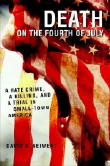Spyhopping the Right.

David Neiwert is a freelance journalist based in Seattle. He is the author of Strawberry Days: How Internment Destroyed a Japanese American Community (Palgrave/St. Martin's Press, June 2005), as well as Death on the Fourth of July: The Story of a Killing, a Trial, and Hate Crime in America, (Palgrave/St. Martin's, 2004), and In God's Country: The Patriot Movement and the Pacific Northwest (1999, WSU Press). His reportage for MSNBC.com on domestic terrorism won the National Press Club Award for Distinguished Online Journalism in 2000. His freelance work can be found at Salon.com, the Washington Post, MSNBC and various other publications. He can be contacted at dneiwert@hotmail.com.

Sara Robinson has worked as an editor or columnist for several national magazines, on beats as varied as sports, travel, and the Olympics; and has contributed to over 80 computer games for EA, Lucasfilm, Disney, and many other companies. A native of California's High Sierra, she spent 20 years in Silicon Valley before moving to Vancouver, BC in 2004. Her lifelong interest in the social effects of authoritarianism have most recently led her to pursue the MS in Futures Studies at the University of Houston. She's also a student member of the Association of Professional Futurists, and member of the Accelerated Studies Foundation advisory board on social and cultural issues. For fun, she raises kids and travels. You can reach her at srobinson@enginesofmischief.com.
Sara's recent series:
Cracks in the Wall: Parts I, II, and III.
Tunnels and Bridges: Parts I, II, III, and IV, plus a Short Detour.
Dave's recent series:
The March of the Minutemen
Intro: Parts 1, 2, 3, 4, 5, and 6.
Unhinged: Unhonest
Parts 1, 2, 3, 4, 5, and 6.
___
Other books by Dave [limited availability]:


"The Rise of Pseudo Fascism": An essay
Available in Adobe PDF format here
Support independent journalism:
Suggested $5 donation

Original posts: Part 1, Part 2, Part 3, Part 4, Part 5, Part 6, and Part 7.
______
Choice essays:
____
"The Political and the Personal"
____
"Bush, the Nazis and America":
Parts 1, 2, 3, and 4.
_______
Rush, Newspeak and Fascism: An Exegesis
[PDF file]
[Suggested $5 donation]
[In HTML: Parts I, II, III, IV, V, VI, VII, VIII, IX, X,, XI, XII, XIII, XIV and XV. See explanatory note.]
[Also available in HTML, and with art, at Cursor.]

_______
Orcinus Principium No. 1
Orcinus Principium No. 2
Why Orcinus?
|
|
| |
|
|
| |
|
|
|
|
|
|
| |
Ann Coulter in Iraq
Saturday, April 12, 2003
"We should invade their countries, kill their leaders and convert them to Christianity." -- Le Coulter
There's a potential disaster brewing in the Bush administration's apparent attempt to deploy some sort of "faith based" relief strategy in Iraq.
'Spiritual warfare' looms
- Washington is trying to portray its battle as one of liberation, not conquest, but Iraq is about to be invaded by thousands of U.S. evangelical missionaries who say they are bent on a "spiritual warfare" campaign to convert the country's Muslims to Christianity.
Among the largest aid groups preparing to provide humanitarian assistance to Iraqis ravaged by the war are a number of Christian charities based in the southern United States that make no secret of their desire to spread the gospel of Jesus Christ and win over Muslim souls.
It's been clear for awhile that, although the Bush administration so far has done reasonably well at keeping the War on Terror from inflating into a global Islam-vs.-the-West conflict -- which of course has been Osama bin Laden's agenda all along -- Bush has no clear idea on how to handle the reconstruction of Iraq.
Currently the plans for handling postwar duties is for the Pentagon to take charge. Defense Secretary Donald Rumsfeld is engaging in a turf scrum with Secretary of State Colin Powell over the matter, and appears to be winning. And Rumsfeld's plan moreover evidently consists of handing it over mostly to a handful of Iraqi exiles whose popular support appears to be mostly nonexistent, and getting the hell out as soon as possible. And it appears that indeed there will be an emphasis on "faith based" humanitarian aid:
Occupation Struggle Pits Pentagon Against Powell, Europe
- The Pentagon recently vetoed as many as eight current and former State Department officials for key posts in the occupation administration, according to the Washington Post. Excluded were a number of former ambassadors and high-level foreign service officers (FSOs) with expertise in the Arab world.
Some sources said they were vetoed because they were "run-of-the-mill" and not "doers," while others revealed they were opposed by Under Secretary of Defense for Policy Douglas Feith, who has supported Israel's Likud Party in the past and is said to consider some candidates to be too pro-Arab, a bias that neoconservatives believe is endemic to the State Department's Near East bureau.
Pentagon chief Donald Rumsfeld has also reportedly insisted that all relief and aid work come under the jurisdiction of ret. Army Gen. Jay Garner, the coordinator of the Pentagon's office of reconstruction and humanitarian assistance, who will report directly to the chief of the U.S. Central Command, Gen. Tommy Franks.
So far, they haven't even been close to being up to the job:
Post-War Iraq: Asking the Right Questions
- The Pentagon's Office of Reconstruction and Humanitarian Assistance, headed by retired U.S. General Jay Garner, is to run Iraq in the initial post-war occupation phase. Its missions encompass reconstituting basic services such as electricity, water, sanitation, and medical care; screening the remnants of the Iraqi civil service for individuals acceptable for retention under a new democratic government; and coordinating humanitarian aid programs run by the World Food Program (WFP), UNESCO, the High Commissioner for Refugees (UNHCR), and private aid agencies.
Difficulties with this arrangement, which is not yet even in place, are already apparent. Despite the efforts of the British forces in Basra, distribution of relief supplies--a duty of an occupying power under international law--has been a shambles. Looting has been rampant. Without the cooperation of the Iraqi public, the number of British troops in-country simply are not enough to create and maintain physical security. And this is for a city of only 1.3 million; Baghdad, which will be the responsibility of the United States, has 5 million people. Euphoria may dampen appetites for a short time, but clean water and nourishing food will soon be demanded.
Not only are there serious questions about whether they are up to the task, but one has to wonder how well this kind of naive evangelism is going to mix in such a volatile environment. More than likely the situation is going to chew them up and spit them out. In the process, there may even be some incidents of violence.
And this, of course, will play directly into the hands of those who wish to see this become a global war. People like Osama bin Laden.
10:47 PM
Spotlight
The other kind of terrorism
Friday, April 11, 2003
Whatever happened to the anthrax killer? You know, the man who terrorized the entire country for the better part of a month?
At least Scott Shane at the Baltimore Sun remembers:
Tests point to domestic source behind anthrax letter attacks
- Army scientists have reproduced the anthrax powder used in the 2001 mail attacks and concluded that it was made using simple methods, inexpensive equipment and limited expertise, according to government sources familiar with the work.
The findings reinforce the theory that has guided the FBI's 18-month-old investigation - that the mailed anthrax was probably produced by renegade scientists and not a military program such as Iraq's.
I guess the anthrax attacks must be another one of those "isolated incidents."
[Thanks to Alice Marshall for the tip.]
9:47 PM
Spotlight
Isolated Event Watch
If anyone needed evidence of the FBI's political leanings, consider the matter of "isolated events."
Whenever right-wing extremists become involved in terrorist activities, it is usually only a matter of time before an FBI official declares that each is an "isolated event."
When an FBI agent is involved in chicanery of some kind or another, it also is determined to be an "isolated event."
Translation: "We have no intention of looking to see if this event represents a deeper and more pervasive problem."
Contrast this to the rhetoric that arises whenever anyone from the left -- whether it's eco-radicals or a center-left president -- gets crosswise with the law. Then we are likely to hear all about how the agency is investigating the possibility of broad conspiracies and nationwide networks and perhaps even international spying and terrorism.
With that in mind, there's the continuing saga of the recent arrest of GOP activist Katrina Leung and an FBI agent, both of whom were are various times involved in drumming up scandals against President Clinton. Both, it turns out, allegedly were at the same time spying for China.
Today came the announcement of yet another FBI agent being implicated in the case. [Link via Atrios.]
Toward the bottom, there's this:
- In congressional testimony Thursday, Mueller called the case "an isolated event" and that ongoing changes at the FBI would ensure better oversight and management of intelligence sources.
Hm.
In case anyone else was paying attention, there was in fact a very similar case: Robert Hanssen, the FBI agent/Opus Dei member who was spying for the Russians.
Hanssen, you may recall, was also involved in ginning up scandals against Bill Clinton.
Now comes this case, where, once again, the agents were involved in concocting Clinton scandals (in this case, the phony "selling secrets to China" scandal).
But of course, there's no connection there, folks. Just move along. Nothing to see.
Lord knows the FBI will never get to the bottom of it.
7:48 PM
Spotlight
Victory, sure, but not vindication

[Courtesy of the Propaganda Remix Project.]
It's no more a surprise that the prowar right is now in full gloat over the rather clear victory of American forces in Iraq, and the gleeful response of the Iraqi populace, than it is that these events occurred in the first place.
Anyone who didn't think the Americans would win was an idiot. Anyone who didn't think the Iraqis would be glad to rid themselves of Saddam likewise was not particularly astute.
Not, of course, that there is much evidence of any more than a tiny handful of such fools arguing for those positions before the war. So why does the prowar right now assume that the antiwar left held such beliefs? Perhaps because it makes a handy strawman?
Yet this assumption is really at the root of all the gloating that is spewing forth from the talk-radio airwaves and throughout the prowar blogosphere right now. It only goes to reveal how little they understood the mainstream liberal antiwar position, as well the utter vacuity of their own arguments.
Make no mistake: It's a wonderful thing that the Iraqi people are now free from Saddam's brutal reign. Indeed, I can argue that I and many others on the left have been fomenting for regime change in Iraq for considerably longer than those on the right who seem to be relatively recent converts to this cause. Indeed, it would not be unreasonable to ask where they've been all these years, while we argued that the Reagan and Bush regimes should stop underwriting their tyranny.
However, declaring war on a sovereign nation simply because we wish to oust the dictators in charge has, heretofore at least, never been the way Americans operated. If it were, we'd have gone to war many times over in Latin America, Asia and Eastern Europe.
That was, however, before the advent of the Bush Doctrine. The essence of the new, post-9/11 American foreign policy is now: America is in charge of the world now, because we are stronger and more powerful than anyone else. If we decide you are a threat, or an obstacle to our foreign-policy goals, we will remove you. Violently. And our entire justification for doing so will rest on the Sept. 11 attacks.
Or as the voice of the new proto-fascist America, Darryl Worley, puts it: "Some say this country's just out looking for a fight / Well after 9/11 man I'd have to say that's right."
When the prowar right is all done gloating, perhaps, it will be time to ask them: OK, what next?
If the justification for invading Iraq was to liberate its people, great. As it happens, there are a bunch of other countries living under perhaps even worse oppression. They too are ripe for "regime change." Do we go there next?
Indeed, some of these nations not only are under totalitarian regimes that cruelly oppress their own people, they also maintain ties to terrorists, and moreover, they also own weapons of mass destruction.
Consider, for instance, China and North Korea.
Both meet the criteria for which we went to war with Iraq, and worse. After all, we know they have nuclear weapons. There's no reason to believe they're not capable of selling these devices to Al Qaeda or other anti-American terrorists. And the barbarities these regimes visit upon their own people make Saddam look like Barney the Dinosaur.
Is there any reason these two -- instead of Syria and Iran, neither of which has demonstrated WMD capabilities -- shouldn't be next in line?
The fact that they're not clearly demonstrates, once again, that the war on Iraq was never about liberating its populace or bringing democracy to a benighted nation. It was never about weapons of mass destruction. It was never about its supposed ties to terrorism and the events of Sept. 11.
No, the Iraq war was always primarily about establishing the Bush Doctrine, which in turn was nothing less than making manifest the agenda of the Project for a New American Century. (There's been a great deal written in recent months about PNAC; for a quick, reasonably accurate summary about its role in the Iraq war, try this, from the CBC: Reality Check: A New American Century.)
Just in case the prowar right wasn't paying attention the first time around, let's reiterate: The mass of opposition to the war had nothing to do with whether we would win. Opposition was always about what kind of nation we are -- and what we will become -- as we combat terrorism.
The Bush Doctrine is hardly anything more than Darwinist "might makes right" bullying, clothing itself in the language of an aggrieved victim. Many Americans were capable of seeing that. And they have a more traditional, and certainly more enlightened, understanding of what global citizenship really is about. They made up the bulk of the people out there marching against Bush's war.
So Bush has won his cynical little war -- one it's clear he chose because he not only could win it, he could sell it. (North Korea -- the far more clear and present danger -- is however a different proposition on both counts.)
That does not, however, vindicate the Bush Doctrine. Before that happens, we're going to have view the long-term results.
To date, the PNAC's plans still appear to be nothing less than a megalomaniacal scheme to rule the world, and in doing so turn nearly every other citizen on the planet into an enemy of America. The cheers for American soldiers in Baghdad would suggest otherwise, but then, the seething hatred for our nation nearly everywhere else in the Arab and Muslim worlds has multiplied as well -- we just aren't hearing about that on Fox News.
Moreover, the majority of those of us opposed to this war continue to do so because it still represents a dangerous and ultimately illogical brand of new American imperialism. It's easy to see that it has certain short-term benefits, such as liberating a handful of nations from their former oppressors. Its long-term consequences, though, are only now being reckoned. Which nation shall we go a-liberating next? Another with vast oilfields, perhaps?
The real danger the Bush Doctrine represents -- of inspiring a fresh round, perhaps even generations, of even more lethal terrorism -- has hardly subsided with the fall of Baghdad.
The gloating of the jingoes may drown out those fears for a day or two. But they will return.
5:51 PM
Spotlight
Strangling dissent
Thursday, April 10, 2003
The violence level edges up another little notch, today in Forest Grove, Oregon -- against a kid from a military family:
The thoughtful debate on war continues
- On April 2, Larson was reading "Great Expectations" after school in the high school commons when he was surrounded by a different group of students. They got in his face.
"This time, their position was I hate America, and I should get out," Larson said. "One of them started strangling me. He had his hands pretty firmly around my neck. I couldn't breathe for a minute or so. Then he hit me with his belt, twice on the legs. `
"The only thing he said was, 'George Bush is your daddy,' which seemed delightfully random."
Only one student, a friend of Larson's, tried to intervene. Two more groups of kids swung by to badger him before he escaped the commons, but no one else touched him. While all this happened 40 feet from the school office, no administrators were on the scene.
3:34 PM
Spotlight
Threats are not protected speech
Wednesday, April 09, 2003
Bryan Pfaffenberger has a post worth reading:
Have right-wing shock jocks violated the law by threatening antiwar protesters?
- When challenged about the legality of such statements, right-wing columnists and editorial writers state that these statements are only made in "jest" or as "political satire," and that the persons making such statements are exercising their free speech rights under the U.S. Constitution. But it's not so simple. Although the various states and US Circuit Courts use varying standards to judge whether a threat constitutes a "true threat," a threat that is not Constitutionally protected, the threat must be considered in its context -- and, as will be seen, there are solid grounds for arguing that some of these threatening statements are illegal.
Of course, local prosecutors have to be persuaded that this is the case too. But it may be time for antiwar organizers to visit such officials and sound them out.
10:22 PM
Spotlight
What needs saying
Tuesday, April 08, 2003
Paul Krugman says it:
The Last Refuge
- For years to come, then, this country may be, in some sense, at war. And all that time, if Mr. Racicot and his party are allowed to set the ground rules, nobody will be allowed to criticize the president or call for his electoral defeat. You know what? If that happens, we will have lost the war, whatever happens on the battlefield.
1:44 PM
Spotlight
No limits
A number of readers have written in to point out that yesterday's post about the Statue of Liberty wasn't exactly right.
Seems a number of right-wing wackaloons have in fact been agitating to return the Great Lady to the French.
One writes in to inform me that the topic has been a favorite of the Howie Carr show in Boston, on WRKO from 4-7 p.m. Reportedly, there were repeated calls last week.
Then there's this little site:
GiveItBack.org
There was a story about this site on a Pittsburgh TV station awhile back. However, what's clear is that this is more in the vein of yet another way to scam conservative half-wits out of their money and wasting it on a futile gesture.
Notably, it includes a link for "those who want to send a protest to France but do not want to send 'Lady Liberty' back', taking them to a page describing how "GIVEITBACK.ORG has recently legally acquired an authentic piece of the Statue of Liberty, which was removed during her renovations in 1982-1992! We plan on sending this symbolic piece back to France in protest." This by way of alternative. Such a gesture would certainly devastate the French.
In any case, another reader informs me that "it later turned out that the entire purpose of the site was to raise the domain name's profile so the owner could flog it on eBay (it turned into an ad for the name after a few weeks)...which he did. I think he made a sizable profit. Which just goes to show again that it all goes back to the money."
Fools and their money are soon parted, as are jingoes and democratic institutions.
In any case, it appears I was wrong: There are no limits to the small-minded idiocy of jingoes.
10:39 AM
Spotlight
Border patrol
Finally, someone is taking on the Arizona militia border patrols, who heretofore have been operating more or less at will without any apparent concern from officials:
State Asked To Investigate Militia Groups
- The organization spent the past two months collection 2,000 signatures which it will present to Arizona Attorney General Terry Goddard next Tuesday. The petitions ask Goddard to conduct an investigation of the militia groups and it they're breaking the law, they should be arrested and prosecuted.
"Arizona has an anti militia law," says Allen, "Which spells out when and how civilians can make arrests and from out interpretation of the law, vigilante groups, civilian groups don't have a right to make civilian arrests."
One can only hope Goddard follows through on this.
10:07 AM
Spotlight
If conservatives were consistent ...
Monday, April 07, 2003
 ` `
They'd be demanding we return this to the French, too.
But then, even small-minded jingoist idiocy has some limits.
10:25 AM
Spotlight
Hypocrisy watch
Sunday, April 06, 2003
In tut-tutting John Kerry for suggesting we need a "regime change," Thomas Oliphant opines thusly:
- It's also misguided to use the word regime, with an antidemocratic connotation, about the United States. President Bush heads an administration, a government. Popular votes and Florida aside, his presidency is the result of constitutional process and it is legitimate. Regime implies otherwise. It is used for dictators and authoritarians, based on its Latin root that is all about ruling, not governing.
It is touching to see Mr. Oliphant's tender sensibilities about the appropriate way to refer to the President extend so deeply on Mr. Bush's behalf. One wonders if such considerations were conventionally applied to Bush's predecessor.
A quick Google reveals 2,100 hits for "Clinton regime" -- many of them from such supposedly respectable voices as the Cato Institute, CBS News, and various Republican members of Congress.
And a search of the Boston Globe's own archives reveals that the phrase has appeared no fewer than seven times in the paper's own pages.
Over Tom Oliphant's strenuous objections, I'm sure.
[]Via the Horse, of course.]
11:01 PM
Spotlight
A note on fascism
Apropos of the last post, but also as a footnote of sorts to the series on fascism:
The hallmark of fascist bullying is the willingness of those devoted to violence to use it upon those unwilling or reluctant to revert to it. "Our contempt for weakness" was a Hitler catchphrase. One expects to hear a form of it pop up any day now.
One of the thinkers on fascism who explored this facet of it in depth was the Norwegian Harald Ofstad. Here's his quick summary:
- Anti-semitism is not at the core of nazism. Its core is that the strong shall rule over the weak, and that the weak are contemptible because they let themselves be ruled. Nazism did not emerge in Germany in the 1930's and it did not disappear in 1945. It is an expression of deeply set emotions which are still there, within ourselves and in our environment.
[Note: I also recently obtained the Robert O. Paxton essay on fascism which Christopher Skinner recommended. I've given it a quick scan and it's brilliant. I'll be digesting it further over the next few days and will report back; it certainly will be an addition to the "Rush" series.]
9:48 PM
Spotlight
Just one question
We're already starting to hear a line of defense being trotted out by conservatives in the blogosphere regarding the increasing thuggishness of the pro-war element, particularly in its confrontational invasions of antiwar rallies, as well as the increase of actual violence and death threats (for the latter, see this latest example from Oxblog, via Atrios).
It runs something like this: These prowar marchers are only voicing their own First Amendment rights. What are you trying to do, shut them up?
Answer: Of course not. The prowar side should feel free to express itself. And its solely pro-war rallies are clearly in the spirit of the best kind of robust civil debate.
But many of these so-called pro-war demonstrations, as I've mentioned, are in fact devoted primarily to invading pre-planned antiwar rallies, many of them merely quiet, 30-person gatherings. They are loud, they are intimidating, and the rhetoric used by the pro-war marchers is vicious in nature.
One wonders about their alleged patriotism, and their devotion to First Amendment free-speech values, when their speech is primarily devoted to shutting up, shutting down, and generally intimidating the opposition into silence.
One wonders about their devotion to the very basics of civil society when they engage in bullying tactics. This includes invading peace vigils with loud trucks and obscenity-shouting prowar marchers.
One also wonders why a number of these invasive "pro-war" (which should more correctly be labeled "anti-dissent") demonstrations are in fact egged on by talk radio -- in some cases, stations with unofficial ties to the Bush administration.
All this wondering leads me to one question: Exactly what do these people think would happen if a large group of antiwar demonstrators appeared at one of the now-numerous pro-war rallies with the explicit purpose of breaking up the demonstration and harassing marchers?
9:29 PM
Spotlight
What drives them?
Regular reader and letter-writer TruthToPower sends this missive:
- Why are the pro-war forces so angry? They have the president, congress and most of the public on their side and we are close to winning in Iraq. Why then do they resort to threats and violence? If my side was batting 1.000 you wouldn't hear one word of complaint from me.
I think these people are just angry. They are angry because they are ignored and exploited by our system. Unfortunately because we are led to believe that we have the best society on earth many of us don't know know how to respond when it becomes clear that the system doesn't work in the interest of the average person.
Enter Rush and company. They bring out the absolute worst in people like this, the "angry white men" who think that a few black people at U. Michigan are responsible for all their problems. I also don't think we should discount the after effects of the 2000 presidential election. It showed that might makes right. You don't have to really win. You bully your way to victory and dare anyone to speak up.
Of course Bush could care less about these people. They are being used by the most cynical administation in modern history. Unfortunately they will keep them angry and confused so that they can invade Iran, Syria or God only knows where.
These are very ugly times.
I couldn't agree more.
I think that what makes them angry is the mere existence of liberalism and anyone who qualifies as a liberal. And ultimately what drives them is the elimination of liberalism altogether.
Certainly, they will never be happy until liberalism is an extinct species, and everyone in America thinks exactly alike -- that is, like them.
And you are right -- the turning point was the 2000 election.
I've commented previously on Justice Scalia's justification, revealed last year in an article he wrote for First Things, for the Bush v. Gore decision and his clear contempt of democracy for its tendency to "obscure the divine authority behind government":
- These passages from Romans represent the consensus of Western thought until very recent times. Not just of Christian or religious thought, but of secular thought regarding the powers of the state. That consensus has been upset, I think, by the emergence of democracy. It is easy to see the hand of the Almighty behind rulers whose forebears, in the dim mists of history, were supposedly anointed by God, or who at least obtained their thrones in awful and unpredictable battles whose outcome was determined by the Lord of Hosts, that is, the Lord of Armies. It is much more difficult to see the hand of God—or any higher moral authority—behind the fools and rogues (as the losers would have it) whom we ourselves elect to do our own will. How can their power to avenge—to vindicate the “public order”—be any greater than our own?"
... The mistaken tendency to believe that a democratic government, being nothing more than the composite will of its individual citizens, has no more moral power or authority than they do as individuals has adverse effects in other areas as well. It fosters civil disobedience, for example, which proceeds on the assumption that what the individual citizen considers an unjust law—even if it does not compel him to act unjustly—need not be obeyed. St. Paul would not agree. “Ye must needs be subject,” he said, “not only for wrath, but also for conscience sake.” For conscience sake. The reaction of people of faith to this tendency of democracy to obscure the divine authority behind government should not be resignation to it, but the resolution to combat it as effectively as possible.
As Dave Johnson suggests, it is clear that Scalia views proper government not as a product of democratic processes, but rather as a contest of wills in which God chooses the stronger and leads him to victory.
In light of the 2000 election, it is clear that this is how Scalia justified a ruling that, conceptually speaking, ran counter to virtually every position he had ever taken, particularly with regard to both states' rights and 14th Amendment equal-protections provisions. For him, it was more an exercise of the raw power he held by virtue of holding a seat on the Supreme Court, all in the pursuit of seating the person whom Scalia believed to have been chosen by God.
This bodes extremely ill for the 2004 election. Should a Democrat threaten to win, it is clear that the gang currently in power sees itself as divinely empowered, and seems likely to seek a way to justify any means, even extra-constitutional ones (as it did in 2000), to hold onto that. This would include unleashing the thuggery of the extreme right on the rest of the populace.
And it is clear that someone like Scalia would approve enthusiastically.
4:01 PM
Spotlight
Cancel the elections
Everyone commenting on the John Kerry debacle has so far focused on the fact that Kerry has fought back admirably against the Republican attacks against him. And when the Republicans have been castigated, it has, for good cause, focused on the fact that they questioned Kerry's patriotism.
But there is a deeply insidious aspect to the Republican attacks. Take, for instance, the press release from RNC chairman Marc Racicot:
- "Senator Kerry crossed a grave line when he dared to suggest the replacement of America's commander-in-chief at a time when America is at war. Critical analysis offered in the best interests of the country is part of a healthy democracy. But this use of self-serving rhetoric designed to further Senator Kerry's political ambitions at a time when the lives of America's sons and daughters are at stake reflects a complete lack of judgment."
Oh really? Does Racicot then believe that the elections of 1972, 1968, 1964, 1944, 1918, and 1864 should have been canceled? Because in each of those elections, the nation was at war. And the replacement of America's commander-in-chief was an open question that no one would have dared to challenge.
It could not be more clear that Racicot is suggesting that "replacing the commander-in-chief" is an unacceptable proposition during wartime, and even talking of doing so is nearly treasonous.
Racicot really needs to explain his remarks. If America is at war in 2004 -- which is clearly a possiblity -- will Racicot and the GOP suggest that anyone daring to challenge Bush has "crossed a grave line"?
I used to chuckle at the left-wing worry warts who suggested paranoiacally that Republicans intended to cancel the next elections. Maybe I shouldn't have.
3:34 PM
Spotlight
|
|
| |
|
|
|